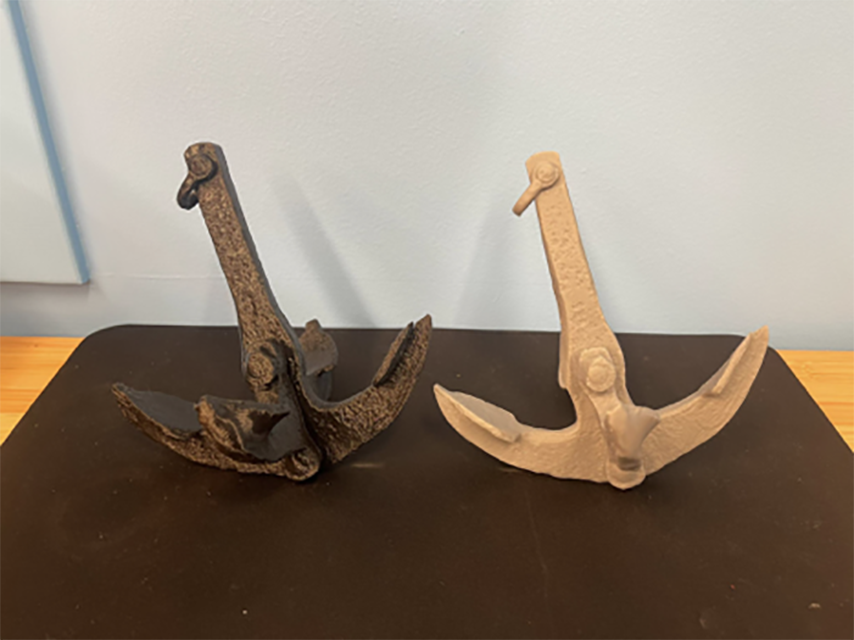UWF Sea3D Lab collaborates with The Mariners’ Museum and Park and NOAA to put pieces of history in public’s hands

Pensacola, Fla. – Mar. 21, 2023 – The University of West Florida’s Sea3D Lab recently partnered with The Mariners’ Museum and Park, the National Oceanic Atmospheric Administration and Monitor National Marine Sanctuary to create artifact replicas recovered from the shipwreck of the USS Monitor. The USS Monitor, the U.S. Navy’s first ironclad vessel built for the American Civil War, fought during the Battle of Hampton Roads on March 8-9, 1862. It sank in a storm off Cape Hatteras, North Carolina nine months later. NOAA and the U.S. Navy recovered hundreds of artifacts from the ship, including the anchor, propulsion engines, gun turret and cannons.
With the help of UWF’s Sea3D Lab resources, the Monitor’s artifacts are now being replicated at The Mariners’ Museum and Park in Newport News, Virginia. Murilo Basso, the UWF Haas Center’s mechanical engineer, traveled to The Mariners’ Museum and Park to scan the artifacts using Artec Eva, a scanner that takes 16 pictures a second and puts pictures together to create 3D models. The scans are being used to create 3D printed objects which will allow the public to put a piece of the Monitor’s past in their hands.
“Artec Eva is a 3D scanner technology that captures high-resolution, accurate and textured 3D models of objects in real-time,” Basso said. “The handheld scanner is equipped with structured light technology and uses a combination of white light and a high-resolution camera to scan and capture data with precision. The collaboration between multidisciplinary fields and the aid of current technology now enables us to share the story of the Monitor in diverse ways and in multiple locations simultaneously.”
Tāne Rēnata Casserley of NOAA's Monitor National Marine Sanctuary learned about UWF’s Sea3D Lab from Nicole Grinnan, public archaeologist for Florida Public Archaeology Network’s Northwest Florida region, who told him about the Lab’s printer and how it was used to create a replica of Tristán de Luna’s anchor. The original anchor is now on display in Pensacola’s Museum of History and the full scale 3D copy is on display at the UWF Archeology Institute.
“Much like the Pensacola Museum of History, even after conservation, Monitor’s artifacts are extremely delicate, and by creating exact replicas with 3D printing, we’re providing access to this incredible naval history in ways we never imagined before,” said Casserley, who is the sanctuary’s resource protection and permit coordinator.
The public is getting a first-hand view of the project. Over the last few months, hundreds of visitors at The Mariners’ Museum and Park watched as UWF Sea3D Lab staff scanned artifacts. The Monitor’s anchor will be showcased at upcoming events commemorating the anniversary of the Battle of Hampton Roads at Newport News local business Ironclad Distillery and The Mariners’ Museum and Park.
“The Monitor story is in part, a story of technology and innovation which brought people together for a common goal in 1862,” said Will Hoffman, director of conservation and chief conservator at The Mariners’ Museum and Park. “So, it’s exciting that through technology and innovation today, we are now bringing people together to share the story of the USS Monitor to current and future generations!”
For more information about UWF’s Sea3D Lab, visit uwf.edu/sea3d.


